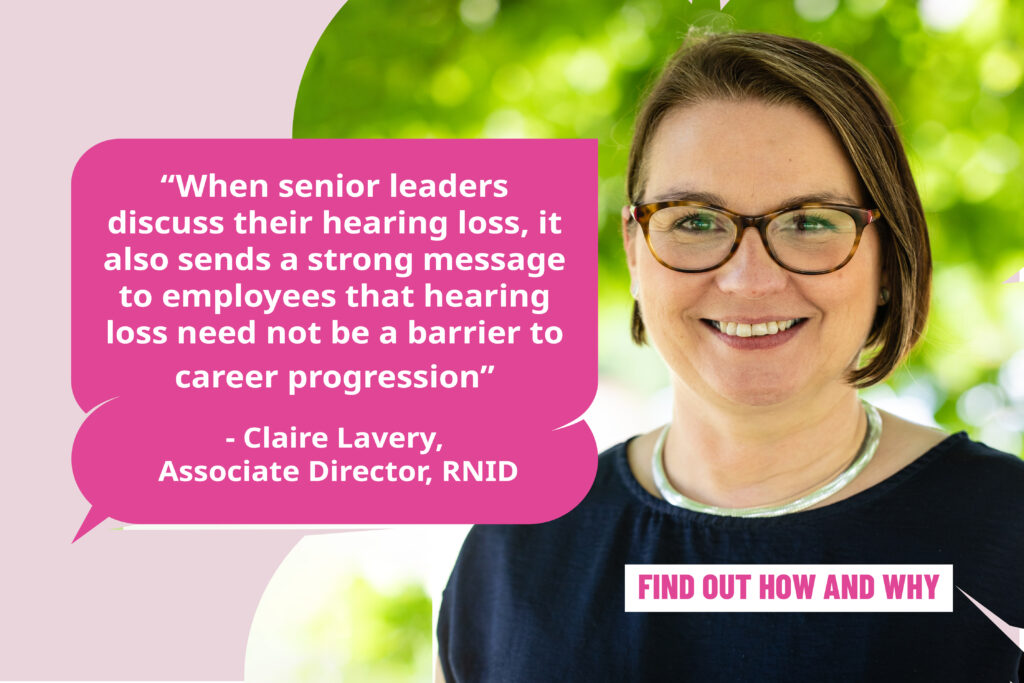
In January 2023 we launched our new report, sharing insight from employers and recommendations from us about how employers can become more inclusive for staff members who are deaf, have hearing loss or tinnitus.
In our second of a series of deep dives on the report with Claire Lavery, Associate Director for Employment, we look at the important role that senior leaders play in championing hearing loss at work.
The role of senior leadership
An organisation’s culture is influenced by and reflected in its senior leadership. Leaders who place value on supporting the health and wellbeing of their staff and champion disability inclusion in their workplaces know that this contributes to the success of their business.
However, leaders who go beyond this to talk openly about their own personal experience of hearing loss, create a culture where staff feel safe to share their experiences and to ask for the support they need.
One organisation we spoke to achieved a significant uplift in disability disclosure rates among their staff after more visible and vocal senior role models spoke about their own lived experience. Another reported how, during an online talk about hearing loss from a senior leader, they watched as the chat bar came alive with comments from staff with a shared experience.
Positive acceptance
Many of the employers we spoke to at our roundtable discussions agreed that senior leaders have a pivotal role in modelling positive acceptance of hearing loss at work.
However, hearing loss is still hidden by most senior leaders. Another organisation which participated in a roundtable cited that none of their 270 senior managers had disclosed a hearing loss, and yet we know that 1 in 8 of them are likely to have some form of hearing loss.
There is a drive in modern organisations to encourage staff to ‘bring their whole selves to work’ but unless senior leaders grasp the opportunity to lead by example, hearing loss will continue to be something that staff keep to themselves.
Career aspirations
We know that people with hearing loss are more likely to work in lower status, lower paid roles. They have also told us that they are concerned that colleagues may perceive them to be less competent and that hearing loss may hold them back from seeking more senior positions.
When senior leaders discuss their hearing loss, it also sends a strong message to employees that hearing loss need not be a barrier to career progression.
What employers can do
In our recent survey only 32% of respondents said their organisation encourages open discussion about hearing loss. Not all organisations are large enough to have staff network groups on disability or hearing loss, but there are other ways to encourage discussion – on observance days, like World Hearing Day, or at Occupational Health events or staff meetings, or by sharing the RNID Hearing Check. You could invite RNID to come along to talk to your staff team alongside one of your senior leaders with hearing loss.
Sarah Petherbridge, who is profoundly deaf and wears hearing aids, was previously a Senior Tax Manager at EY and is now a freelance disability awareness trainer and public speaker. Here she shares her thoughts on what leaders can do to change the culture in their organisations towards becoming inclusive and welcoming.
Having an inclusive leader makes a difference – you feel safe and belonged…. Leaders set the tone for the culture and people look up to them to copy their behaviours and cultures.”
“There are lots of steps you can take to become an inclusive leader, for example:
- Be aware of your own preferences and biases as a leader
- Be open to other people’s perspectives when decision making and encourage team members to offer new approaches and ideas in a safe environment
- Be explicit about the importance of understanding and valuing differences, such as cultural differences
- Be consistent and accountable – maintain consistent inclusive behaviours as role models and reinforce the need for accountability
- Adapt your own and others’ working styles to work with others effectively – remove any discomfort and stigmas. This will accommodate people’s disabilities so that they can work in a safe environment without fear.”
Get in touch
If you are a senior leader with experience of hearing loss and would like to help RNID to engage and inspire others in your industry, please get in touch.